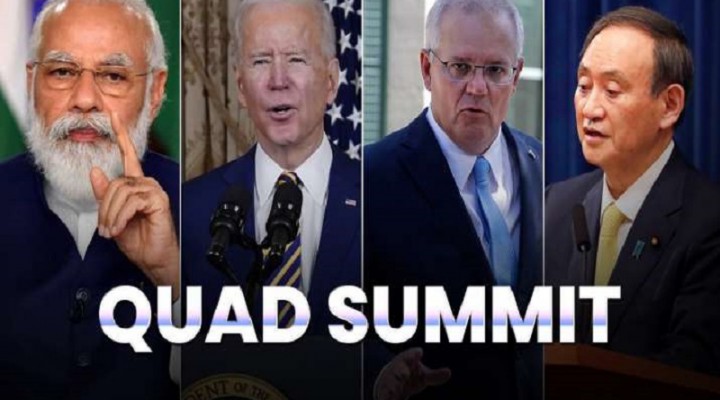The First-Ever Quad Leadership Summit Confirmed The Bloc’s Anti-Chinese Purpose

The bloc thought that it could dispel suspicions of its motives by emphasizing that it came together for humanitarian reasons almost two decades ago but that narrative is nothing more than an attempt to deceive the rest of the world.
The Quadrilateral Security Dialogue, popularly known as the Quad, held its first-ever leadership summit on Friday via virtual means. The leaders of the US, Australia, India, and Japan discussed a slew of issues that concern their mutual interests in the broad space that they describe as the Indo-Pacific. The bloc has long been suspected of tacitly harboring anti-Chinese intentions, but its leaders attempted to clarity that this isn’t the entirety of its purpose in their joint statement that was released after their video conference. In fact, they didn’t even directly address China at all, though they did imply that it was discussed during their meeting.
The only indirect reference to China was the joint statement’s claims that its members “will continue to prioritize the role of international law in the maritime domain, particularly as reflected in the United Nations Convention on the Law of the Sea (UNCLOS), and facilitate collaboration, including in maritime security, to meet challenges to the rules-based maritime order in the East and South China Seas.” Nevertheless, this is still very significant since it directly affects China’s national security interests in those two bodies of water considering its territorial claims there that are contested by several other countries.
The Quad’s joint statement also pointed out that this bloc was supposedly created after the 2004 tsunami, though without mentioning the growing consensus in their countries over the past few years that it’s actually a platform for attempting to contain China. Their talk about shared interests in the spheres of trade, humanitarian aid, disaster relief, cybersecurity, COVID-19, investment, and other such topics actually seem to be a smokescreen for strengthening coordination between them on these fronts in order to more rigorously compete with China.
Of particular concern is the Quad’s references to a “free and open Indo-Pacific”, “democratic values”, and “territorial integrity”, which can be understood by the larger strategic context as being directed against China. That’s because those countries have repeatedly accused China of allegedly undermining all three of those interests around which the Quad is converging. At face value, the bloc’s claims of ASEAN’s centrality seem innocuous enough but take on a more sinister meaning if one suspects the Quad of trying to court those countries for the purpose of containing China in the South China Sea.
With this in mind, the Quad’s first-ever leadership summit did indeed clarify the bloc’s purpose through its indirect strategic references to containing China, which are patently obvious to those observers that are capable of reading between the lines in the current strategic context. The bloc thought that it could dispel suspicions of its motives by emphasizing that it came together for humanitarian reasons almost two decades ago but that narrative is nothing more than an attempt to deceive the rest of the world. The Quad has always had tacit anti-Chinese intentions, though these don’t need to remain its raison d’etat.
For example, instead of excluding China and aiming to contain it, the Quad could incorporate the People’s Republic into this transregional platform through non-military outreaches focused on trade, investment, infrastructure, COVID-19, climate change, and disaster relief. It’s impossible to contain China, let alone in its home region, which is why the Quad should focus on cooperating with it. The overarching purpose of such outreaches could be to lay the basis for expanding the Regional Comprehensive Economic Partnership (RCEP) which Quad-members Australia and Japan are already part of with China to include the US and India with time.
The Indo-Pacific isn’t “free and open” when China is excluded from the Quad’s emerging transregional integration platform, nor are “democratic values” embraced by refusing to cooperate with it. To the contrary, the Quad is attempting to make the Indo-Pacific increasingly captive and closed in an anti-democratic way which threatens China’s territorial integrity in the East and South China Seas. It’s for this reason why the Quad must radically reconsider its raison d’etat by moving away from its doomed-to-fail attempts to contain China and towards actively cooperating with it instead.
 TheAltWorld
TheAltWorld 
0 thoughts on “The First-Ever Quad Leadership Summit Confirmed The Bloc’s Anti-Chinese Purpose”